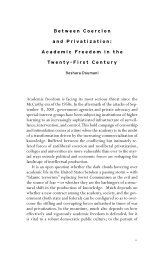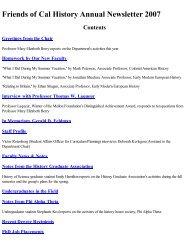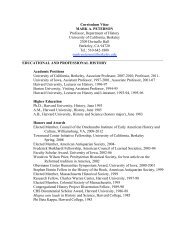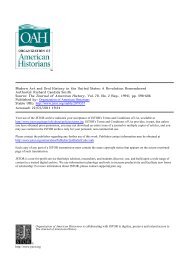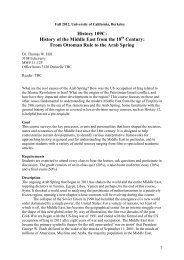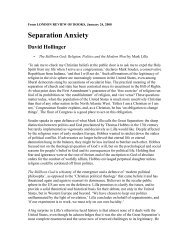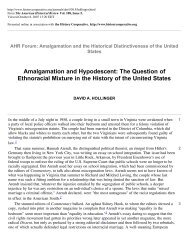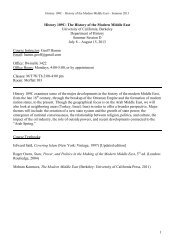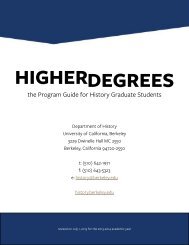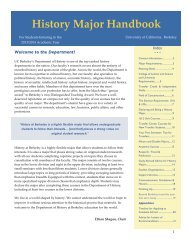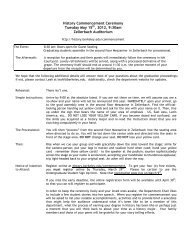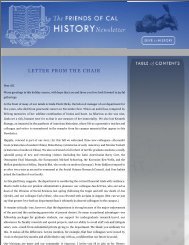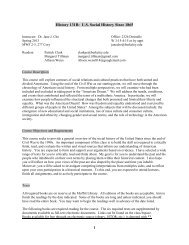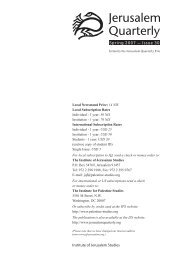Chester N131B Summer 2012.pdf
Chester N131B Summer 2012.pdf
Chester N131B Summer 2012.pdf
You also want an ePaper? Increase the reach of your titles
YUMPU automatically turns print PDFs into web optimized ePapers that Google loves.
1MTWR 10-12 130 WheelerInstructor: Robert <strong>Chester</strong>Email: robertnchester@gmail.comHIST<strong>N131B</strong>:Social History of the United States Since 1914Course Requirements:Participation: 10%Midterm: 30%Essay: 25%Final Exam: 35%Required Texts-Larry May, Screening Out the Past: The Birth of Mass Culture and the Motion PictureIndustry, (University of Chicago Press, 1983) ISBN-13: 978-0226511733-Richard Wright, Black Boy, (Harper Perennial, 2007) ISBN-13: 978-0061130243-Elaine Tyler May, Homeward Bound: American Families in the Cold War, (BasicBooks, 1990) ISBN-13: 978-0465030552-Mae Ngai, Impossible Subjects: Illegal Aliens and the Making of Modern America,(Princeton University Press, 2005) ISBN-13: 978-0691124292-James Welch, Winter in the Blood, (Penguin Classics, 2008) ISBN-13: 978-0143105220-Bspace-Course Reader Available at Copy Central on Bancroft WayCourse Description: This course satisfies the campus’ American Cultures requirement.It examines the ways that larger structural forces shaped and continue to shape theeveryday lives of Americans from the beginning of the twentieth century to the presentday. Conversely, we will also examine the actions taken and choices made by individualsand groups who tried to adapt to rapid cultural, economic, and social changes and otherswho believed that desired changes proved elusive and halting.We will begin our semester by exploring the contradictory impulses ofProgressive Reform movements. Many Progressive Era activists combined motives ofboth social justice and social control in their strategies to achieve tenement reform, laborreform, improvements in public health, expanded access to birth control, women’ssuffrage, prohibition, and other causes. We will explore the horrific Triangle ShirtwaistFire that occurred in New York in 1911. Students will learn how this tragedy provokeddebates about workplace safety, the labor of women, and the excesses of capitalism.Next, students will read Larry May’s Screening Out the Past which demonstrates how therise of movies and the creation of Hollywood contributed to the growth of a massconsumer culture that transformed how Americans thought about themselves both asindividuals and members of imagined communities. As they rapidly increased their activeparticipation in an expanding consumer society, audiences also began to follow cultural
cultural autonomy, and social improvement. To this end, students will view The Times ofHarvey Milk. The documentary chronicling the life and death of Milk will exposestudents to the many struggles, achievements, and enduring legacies of a leader whohelped shape a growing movement to empower the LGBT community. In addition to theways that movements fashion new identities for their members, students will also explorethe ways that some individuals struggle to navigate the identities and expectationsimposed upon them by their families and communities. James Welch’s novel, Winter inthe Blood, depicts the coming-of-age struggles of an American Indian teenager living inan economically depressed and geographically isolated region of Montana after WorldWar II. In an environment of alcoholism, racism, and poverty, Welch examines theconflicted character of family, community, and identity for Native Americans in the latetwentieth century. Family provides a source of strength and support as well as sufferingand shame in Welch’s novel. In the context of learning about the American IndianMovement and the seizure of Alcatraz, Welch’s novel provides a more nuanced view thathelps to ground students in the everyday lives of people who remained on the racial andgeographic margins of white society.Analyses of the New Deal and the Great Society will explain the historicalcontexts and political circumstances that allowed for the creation and later the expansionof social welfare programs that responded to dire needs, structural inequalities, and thedemand for more effective taxation and regulatory policies. In exploring Franklin DelanoRoosevelt and the New Deal, students will first examine the structural economic causesand cultural trends that contributed to the Great Depression. Then, we will explore boththe ways that ordinary Americans adapted to these challenging new circumstances. Next,students will learn about the political strategies employed by the president and his allies,the important new coalitions formed, their legislative achievements, the emergence ofKeynesian economic policies, and the limitations of New Deal reforms. By extension,subsequent lectures and readings will examine the efforts to both expand and erode socialprograms and regulatory reforms by Truman, Eisenhower, Kennedy, Johnson, Reaganand others.The course also examines how the Cold War shaped political ideologies, familystructure, gender relations, suburbanization, and consumer culture. To this end, studentswill read Elaine Tyler May’s Homeward Bound, a social history of family and America’sBaby Boom. Homeward Bound provides students with insights into the ways that theeveryday actions of middle-class Americans living in newly-built suburbs reflected theanxieties of Cold War fears of nuclear war, white flight and urban decline, and the questfor an illusory past where gender conventions were stable and reassuring. Students willalso learn about the many social movements that emerged from the late fifties through theseventies and how many activists of this so-called New Left tried to expand definitions ofequality, reclaimed and reinvented identities, and struggled to solve enduring problems ofpoverty, violence, sexism, racism, and homophobia.Ultimately, we will also analyze the deep roots of America’s economic declinefrom 1970s forward. Lectures, readings, and films will illuminate the economic andsocial impacts of deindustrialization, deregulation, Neo-Liberal economic policies, urbancrises, tax revolts, the Reagan Revolution, the defunding and dismantling of socialservices programs, and the transformation of labor markets and job opportunities. Thus,to end the course, students watch Michael Moore’s Roger & Me and read excerpts from3
5Laptops and Other Electronic Equipment: If you wish to use a laptop to take notesduring my lectures, feel free to do so. However, please sit in the very back of the lecturehall in order to avoid distracting other students. Please refrain from texting ormanipulating your phone or other gadgets while in class. More generally, please actcourteously out of respect for me and your fellow students during both lectures anddiscussions. Thank you.bSpace: The instructor will use bSpace (https://bspace.berkeley.edu/) to provide studentswith a range of course materials. The instructor will post the following on bSpace: thesyllabus, lecture outlines, discussion questions for assigned readings, writingassignments, and primary documents. The instructor will also use bSpace to makeannouncements, such as reminders about deadlines and extended office hours.Course Calendar(Assigned Reading: Documents on Women on bspace; Larry May, Screening Out thePast, pp.v-viii, xi-241)Monday, May 21: 1) Introduction & Orientation 2) “The White Man’s Burdens:Immigration and Imperialism”Tuesday, May 22: “Laboring for Many Causes: Workers, Progressives & Reform”Wednesday, May 23: 1) “The Social as Political: Women, Progressivism, and Reform”2) Discussion of Documents on WomenThursday, May 24: “Mass Slaughter, Repression & Regret: Americans & WWI”(Assigned Reading: RichardWright, Black Boy, pp.3-257; Mae Ngai, ImpossibleSubjects, pp.xix-90)Monday, 28: No Class/Memorial DayTuesday, May 29: “From Character to Personality to Celebrity: ManufacturingAbundance and the Growth of Consumer Culture”Wednesday, May 30: 1) “Restless Natives: the Ku Klux Klan, Fundamentalism, andOther Isms” 2) Discussion of May, Screening Out the PastThursday, May 31: 1) “Oppression & Exodus: Jim Crow & the Great Migration”2) “Exodus & Emigrant Subcultures: The Dust Bowl & the “Okie” Migration”(Assigned Reading: Wright, Black Boy, pp.258-384; Excerpts from Studs Terkel, HardTimes and The Good War in Course Reader; Great Depression Documents on bspace;Ngai, Impossible Subjects, pp.167-201)Monday, June 4: 1) Discussion of Wright, Black Boy 2) “‘In the Long Run We Are AllDead’: Relief, Reform & Keynesian Strategies”Tuesday, June 5: 1) Discussion of Terkel, Hard Times & Great Depression Documents2) “‘Best War Ever’: Americans & WWII”Wednesday, June 6: 1) Discussion of Terkel, The Good War & Ngai, ImpossibleSubjects, pp.167-201 2) “Prosperous Places: Creating Suburbia”Thursday, June 7: Midterm Exam



